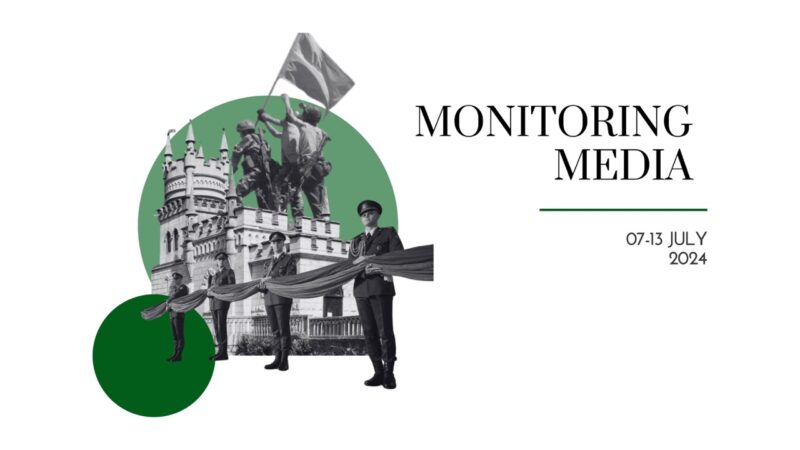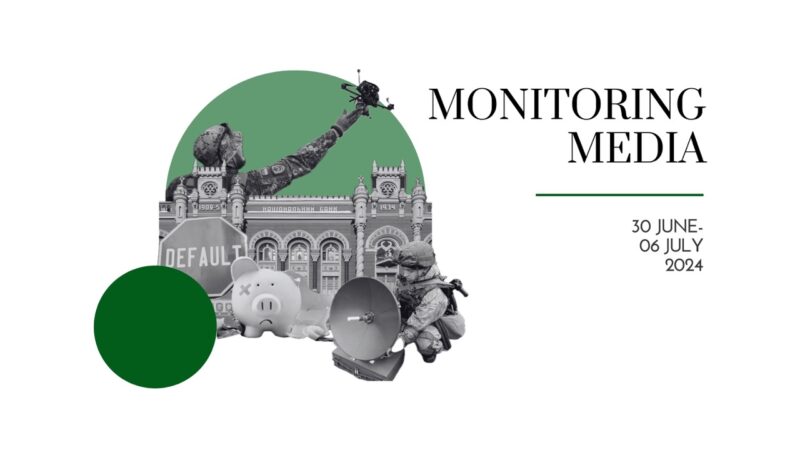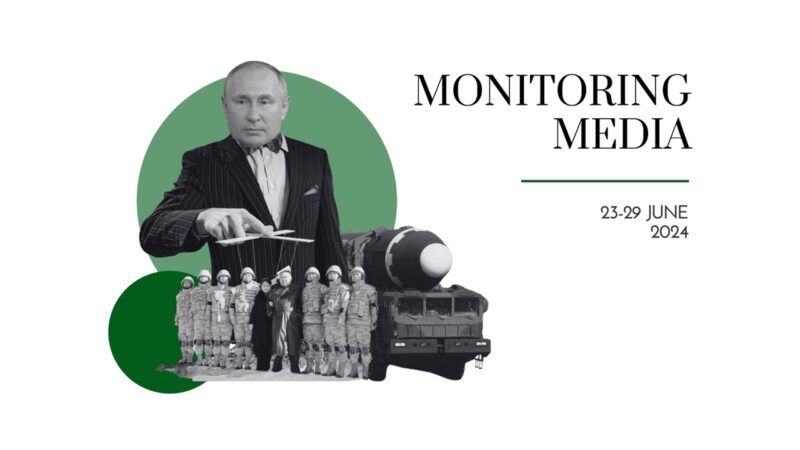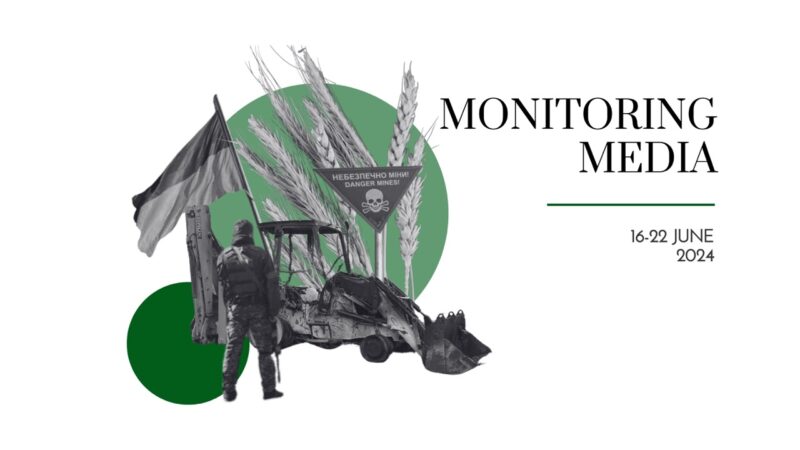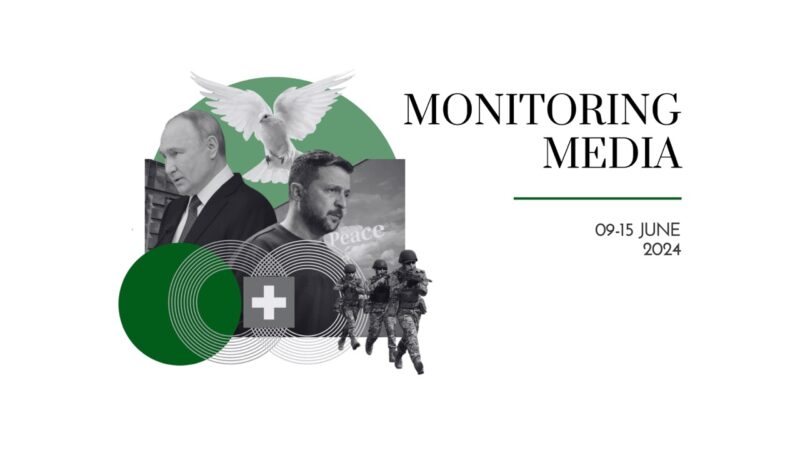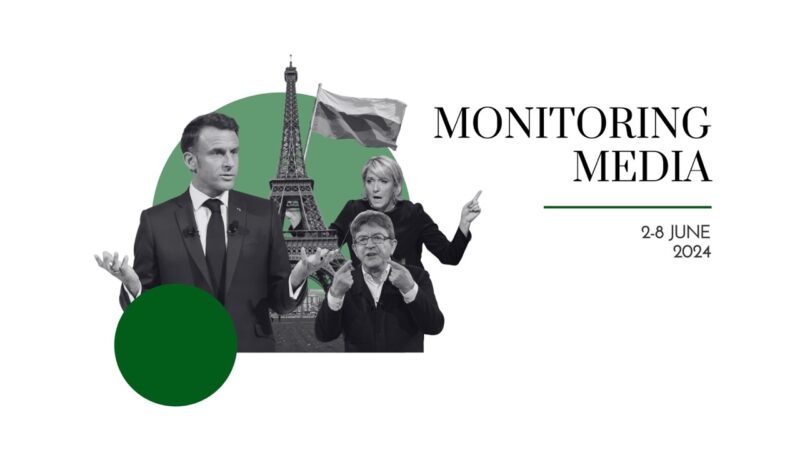The West gives too much credit to Russia and too little ammunition to Ukraine
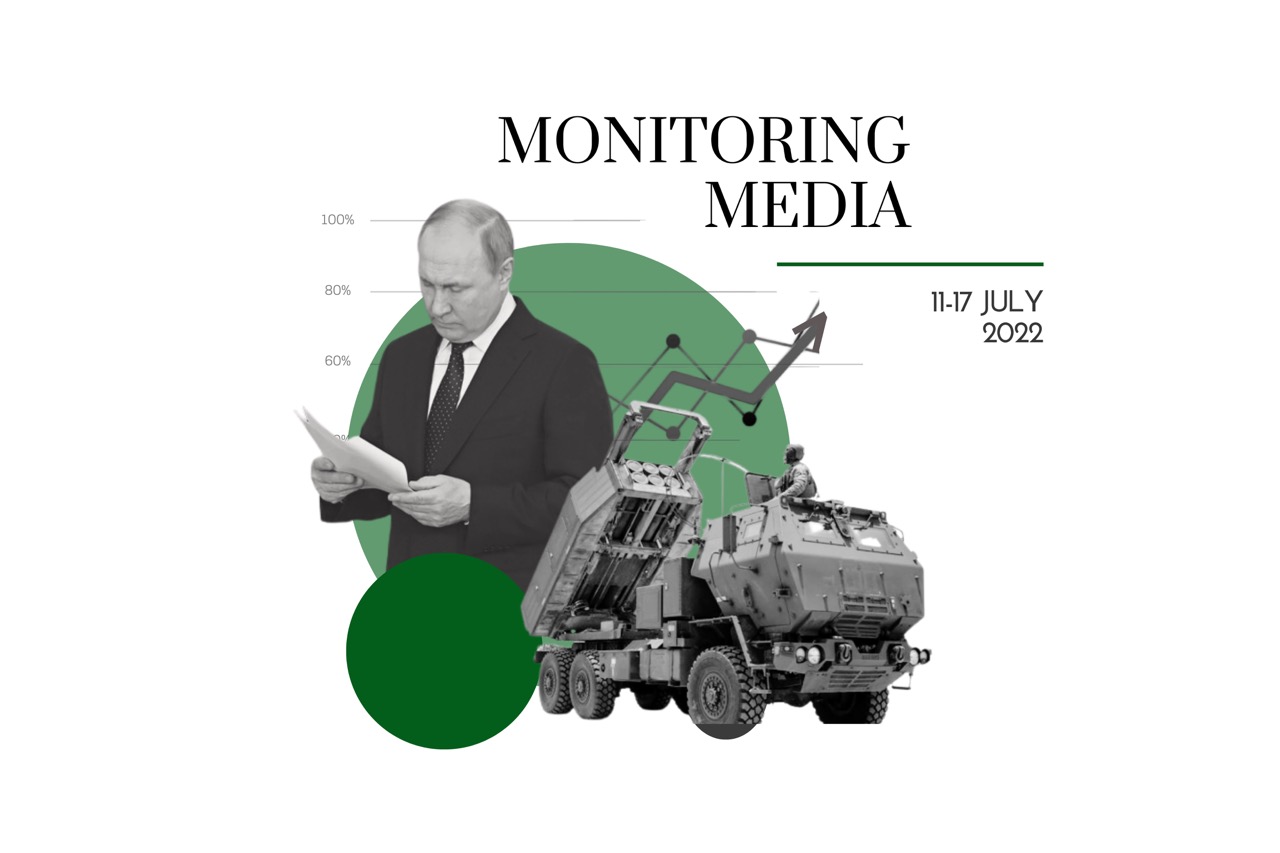
CIUS weekly report on media coverage of Ukrainian affairs, 11–17 July 2022
Three North American magazines (Foreign Affairs, Foreign Policy, and Atlantic Council) were selected to prepare this report on how the situation in Ukraine has been portrayed in the media during the past week (11–17 July 2022). The sample of magazines was created based on their impact on public opinion, as well as their professional reputation, popularity among the readership, and topical relevance. These three magazines represent the centrist and liberal political spectrum.
This report covers only the most-read articles about Ukraine, as ranked by the respective magazines themselves in the past week. It also covers promoted texts on home pages, texts from special sections on Ukraine, texts from the paper editions of the magazines, and texts about Ukraine from opinion columns and editorials.
Topics featured in the selected articles:
- Ukraine at war: EU candidate status accelerates wide-scale reforms; strengthening of the rule of law should be prioritized over other postwar reforms; Ukraine’s martial law legislation inflicts unnecessary harm on individuals;
- The world and Ukraine: The UK remains Ukraine’s partner after PM Johnson resigns; the West and NATO are needlessly cautious in their support of Ukraine; the West revises its export policies for dual-purpose goods; existing NATO-Russia arrangements are dysfunctional but not pointless;
- Russia at war: invasion of Ukraine was Putin’s revenge against the West; the invasion boosted patriotism and Putin’s popular support in Russia; the resources to continue the offensive in Ukraine are limited; forceful Russification is common practice on occupied territories.
The most common arguments:
Ukraine’s EU candidate status is a historic opportunity to transform the state. Kira Rudik (Atlantic Council) starts with a statement that “by granting candidate status, all 27 EU member states have recognized Ukraine’s importance to the wider European community.” At the same time, Ukraine needs to accomplish a series of reforms to avoid standing in line for full EU membership, as Turkey has been forced to do. Rudik argues that the reform priorities should reside in rebuilding the judiciary and the fight against corruption. These reforms are pivotal for the state’s reconstruction, particularly for effective management of postwar investments. Other important reforms entail reducing the influence of oligarchs on national life, liberalization of trade, and building an inclusive civil society. Rudik encourages the authorities in Kyiv to capitalize on the popular demand for reforms as “the unprecedented trauma and turbulence unleashed by Putin’s war have created the momentum to finally move Ukraine away from the chronic corruption of the post-Soviet era.”
Ukraine should prioritize adherence to the rule of law after the war is over. Bohdan Vitvitsky (Atlantic Council) takes over from where Rudik left off and claims that construction of a transparent legal system in Ukraine has always been high on the agenda, yet low on implementation: “This is particularly so given that Ukraine emerged from the ruins of the Soviet Union and inherited what was a fundamentally debased legal system.” Vitvitsky highlights that Ukraine’s legal reforms have been partially successful since the 1990s. The Prosecution Service was stripped of its repressive powers, while the National Anti-Corruption Bureau became a new transparency watchdog. At the same time, “the judiciary remains a mess” and is plagued with corruption. To strengthen the rule of law, Ukraine should create a “legal fire brigade” consisting of three bodies that include experienced Ukrainian and European lawyers, politicians, and civil activists. Vitvitsky also ponders on operational tools, goals, funding, and powers of that “legal fire brigade.” He believes that its paramount objective is to “significantly reduce corruption, increase overall legal system effectiveness, and avoid harmful unintended consequences that arise when proposed changes are not well thought out.”
Ukraine’s requirement for civilian men to stay within the country’s borders may cause more harm than good. Charli Carpenter (Foreign Policy) scrutinizes the bitter side-effects of Ukraine’s legislation that prohibits male citizens from crossing the borders of their state and, most recently, freely moving between Ukraine’s districts and oblasts. In light of these prohibitions, Carpenter concludes that young civilian men not only have their human rights limited, but feel “terrified and desperate.” As an illustration, he provides a story of Andrii, whose “mother, sister, and fiancee fled to London and he was forced to stay behind.” Andrii can neither support his sick relative from Ukraine nor even fully sustain himself because of the challenges he faces when searching for a job or accommodation during the war. On top of this, Andrii is afraid to be conscripted and deployed to the battlefield without proper training. Carpenter highlights the counterproductivity of male-discriminating Ukraine’s legislation, as it forces the unemployed and lonely men to “sit on the couch” instead of contributing to the state’s victory with their skills. There would be more sense if men could work in another country and support financially Ukraine’s army and people in need. Moreover, many women, especially pregnant ones, decide to stay in Ukraine under bombings with their husbands instead of fleeing to the West. They claim that they will have difficulties accommodating abroad on their own, without their husband’s support. Carpenter highlights that numerous petitions to President Zelensky appeared recently to remove the ban on travelling for men with no previous military experience, but these petitions are yet to be scrutinized by the authorities.
The UK will continue supporting Ukraine after Boris Johnson’s resignation. Edward Lucas (Foreign Policy) provides an overview of the UK’s domestic and foreign policies under Johnson’s government. Abroad, especially in Ukraine, the PM has created a powerful fan club that will outlast his popularity at home. In this respect, Johnson followed the path of Margaret Thatcher and Tony Blair, who are revered in Central and Eastern Europe. Johnson was one of the first world leaders to help Ukraine counter Russia’s invasion and this, inter alia, helped him to outplay opposition parties in the domestic arena. At the same time, Russia’s presence in the UK got strengthened over the past decade not least to Johnson’s misconduct. His government “has largely failed to fight Russia on the most important battleground: access to Britain’s financial, legal, and political systems.” Personally, Johnson tried to prevent the publication of the report on Russia’s influence in the UK, provided “a peerage to his friend Evgeny Lebedev, son of a former top KGB man in London,” and overlooked very generous donations to his party by a Russian businesswoman with close ties to the Kremlin. That said, Lucas concludes that whoever replaces Johnson in his post will not change the strategic line of the UK’s foreign policy: “every contender is ostentatiously supportive of Ukraine. Coupled with multipartisan support for military and other aid to the embattled country…it is tempting to tell nervous allies not to worry and that Britain’s policies will not change.”
US rocket launchers are not enough for Ukraine’s counter-offensive to succeed. Jack Detsch (Foreign Policy) describes how the US-supplied High Mobility Artillery Rocket System (HIMARS) has changed the progress of the war in Ukraine. In particular, Detsch notes that Ukrainians can use this equipment and “rack up a major cost in Russian ammunition, supplies, and likely lives.” He also writes that the Russians are not prepared to repel long-range missile attacks and have started suffering similar logistical issues as they did in the first days of the escalated invasion near Kyiv. This said, the HIMARS has not become a ground-breaking weapon yet. Firstly, the Ukrainian army lacks the most advanced missiles, which are capable of hitting a target 200 miles away. Secondly, there are already a good number of these systems deployed in Ukraine, notwithstanding Kyiv’s plea to obtain a few hundred more. Detsch concludes that “Even with the HIMARS screaming and more Russian ammunition depots going boom in the night, experts believe that new American weapons are likely to simply reinforce the status quo on the ground: a protracted stalemate.” To regain land from the “occupier,” Ukraine needs to win a close combat fight between infantries, not artillery duels.
The West and NATO can provide more support to Ukraine without provoking Russia. Dan Altman (Foreign Affairs) highlights the point that due to the threat of Russia’s nuclear retaliation, the US and NATO “will not intervene directly in the conflict, instead limiting their help to weapons, money, intelligence, and sanctions.” At the same time, according to Altman, there are only two red lines that NATO should not cross to aggravate the Kremlin. The first is to fire directly on Russia’s troops and the second is to deploy combat units under NATO auspices in Ukraine. In this light, NATO could definitely do more by equipping Ukraine, strengthening sanctions on Russia, and organizing international volunteers who want to fight for Ukraine; Altman dedicates most of his attention in the article to volunteers. Examples from history such as the post-WWII Berlin blockade or the Cuban missile crisis demonstrate that the Kremlin will not retaliate militarily if NATO and Western states do not inflict direct physical harm to Russia’s soldiers, territories, or property.
The war in Ukraine prompted the West to strongly control its hi-tech exports. Emily S. Weinstein (Foreign Affairs) starts by declaring that the West has imposed on Russia the harshest sanctions the world has seen since the end of the Cold War. Apart from this, the West introduced new regulations on exports of “sensitive military technology and items relevant to weapons” to weaken Russia’s military capacity. These new regulations expand the list of dual-purpose goods that are prohibited to be shipped to Russia, block the Russian military machine from accessing all US-made commercial goods, and enacted a common licensing and restrictions policy on dual-purpose goods shipped to Russia. Weinstein portrays the innovativeness and appropriateness of these new regulations by placing them in a framework of the existing multilateral export control regimes, which seem to have many gaps. She also enquires the US to become a leader in designing a new global export regime that would be binding for the democratic states in the first place, and outlines steps on how to do this.
The NATO-Russia Founding Act is not working, but neither side wants to acknowledge this openly. Amy Mackinnon (Foreign Policy) writes that the NATO-Russia Founding Act was signed in 1997 “to establish some parameters for cooperation between the Cold War foes in an optimistic era when the prospect of a constructive Western relationship with Moscow appeared to be within reach.” This said, as of today many of the provisions of this act have been violated by the Russian Federation, often under imaginary premises. While the document lost its actual regulatory powers, it remains a fundamental formal point of reference for Western officials to justify their policies. In particular, this relates to the enlargement of NATO into Central and Eastern Europe—against which Russia, as an allegedly democratic partner of the Alliance, should have never protested. Mackinnon concludes that the major pragmatic reason why the Act has not been scrapped yet is that it may “provide some guardrails for a future relationship” between the signatories.
The war in Ukraine is Putin’s personal obsession and revenge against the West. William Taubman (Foreign Policy) narrates a detailed story of the ascendancy of Vladimir Putin to power, with an emphasis on how vengeful his personality has become: “The roots of Putin’s recklessness go back to a tendency he has shown since childhood to lash out when he has felt wronged or betrayed. Later passages of his life [turned] a boy who brawled his way through adolescence into a man who has directed his wrath against a U.S.-led West.” The need for vengeance and a distorted feeling of justice, amplified by isolation during the global pandemic (and possibly disease), were important factors that clouded Putin’s calculating mind and pushed him to a poorly planned invasion of Ukraine. During more than two decades of Putin’s steering the politics of the Russian Federation, he evolved from a person who wanted to make his state more open to the world to a convinced revenger who purports to fight global evil, punish cheaters, and restore the Russians’ manifest destiny (as it is identified by himself). Taubman provides dozens of facts from Putin’s biography that can explain his contemporary modus operandi and sketches five scenarios of the future centred around Putin’s figure: abortive coup in the Kremlin (unlikely), Russia defeating Ukraine (desired by Putin, but highly unlikely), return to the front lines existing on 23 February 2022 (unlikely), conversion of the war into a frozen conflict (acceptable by Putin, but unlikely), Russia’s nuclear retaliation (unlikely, but may eventually be authorized by Putin).
Putin ordered the war in Ukraine, falling victim to his personal complexes and fears. John Sweeney (Atlantic Council), the author of the book Killer in the Kremlin, provides his understanding of contemporary Russia and connects the personality of Vladimir Putin to the recent atrocious and murderous misconducts authorized by the state. Sweeney focuses on the reasons behind Putin’s ruthlessness in waging wars in Chechnia, Georgia, Syria, and recently Ukraine. He also describes a number of “black flag” operations, leading to dozens of deaths and being executed by Russia’s special services on the territory of their state, to boost up certain pro-Putin political agendas. Finally, Sweeney analyzes cases of murders of Putin’s personal enemies, such as Yuri Shchekochikhin, a former MP and investigatory journalist. From Sweeney’s perspective, contemporary Russia is a mafia state where the President serves as an unassailable boss. Sweeney concludes that “if you study Putin’s career, you realize that we are dealing with a hyper-aggressive psychopath whose word cannot be relied upon. He is a man who identifies compromise as weakness; who sows dissent and mistrust in the West; who likes killing.” In this respect, Sweeney indirectly confirms some of Taubman’s observations.
The war strengthened Putin’s support at home as it brings false satisfaction to Russians. Andrei Kolesnikov (Foreign Affairs) points to the fact that ordinary Russians are not feeling the reverberations of war in their daily lives. Recent Levada Center polls demonstrate that “half of respondents [in Russia] say [economic] sanctions will strengthen the country and stimulate development, and another quarter say sanctions will have no negative effect on growth.” Popular support for Putin crossed the threshold of 80 per cent, which is ten points above pre-war figures. Speaking of the invasion, many Russian respondents do not feel any remorse; quite the opposite, they are proud of their state and their army. This said, with no end to the invasion in sight, common Russians start discovering a new and more challenging environment “in which it is essential to behave like a patriot and support Putin’s theatrics and not concern themselves with temporary hardships.” Within this environment, the Kremlin will continue investing economic and military resources into the pursuit of its neo-imperial ambitions regardless of the increased strain that will be put on Russian citizens. In their turn, by relishing the bloody conquests of their state and blaming imaginary enemies of the empire for any hardship, Russian citizens will further legitimize the Kremlin’s aggression and pay less attention to the deteriorating conditions of their daily lives. Kolesnikov states that “the war has become a bad new normal” and “in the new Russia, everyone is fine as long as he or she is not forced into the trenches.”
Kremlin does not have enough time or resources to wage protracted war in Ukraine. Ravi Agrawal (Foreign Policy) interviews Fiona Hill, a top advisor on Russia to three US presidents, on perceptions of the war in the Kremlin. Hill considers that Putin may be running against time limits as the longer the war lasts the less stable his system becomes. This may be deduced from the growing backlash among people in Buryatia and Dagestan, many of whom lost their closest ones on the battlefield, as well as in protest moods all across Russia that are fuelled by economic decline. Even being an autocrat, Putin wants to see himself as legitimate, which puts him under pressure. Hill also considers that Putin has always been a wartime president. From his earliest days in the Kremlin, he was inclined to wage information campaigns. Today, he continues discrediting opponents, occupying territories, introducing blockades, threatening with weapons of mass destruction, and committing other acts of aggression as if they were ordinary. Hill argues that the victory in Ukraine for Putin entails the destruction and absorption of the sovereign state. Anything else is pure rhetoric to solidify Russia’s gains and renew attacks in future. Finally, Hill believes that Putin is capitalizing on anti-European sentiment in the Global South to solidify Russia’s neo-imperial presence there and convince local states to support his side in the war. The leniency of China on this and similar issues makes Russia look stronger than it is.
Russia’s forceful replacement of Ukraine’s civilian ‘passports’ in occupied territories a dangerous escalation of the war. Peter Dickinson (Atlantic Council) begins by stating that “Vladimir Putin escalated his war against Ukrainian statehood on July 11 by expanding the fast-track distribution of Russian passports to include the whole of Ukraine.” Unlike the previous procedures of acquiring Russian citizenship, this one is very aggressive and conducted on a massive scale. Through forceful passportisation, the Kremlin aims “to establish control over the whole country and extinguish Ukrainian independence once and for all.” Ukrainians who are trapped in the occupied regions often have no option but to accept Russian passports in order to retain their jobs, acquire healthcare and banking services, or register cars and property. Those Ukrainians who resist are often jailed in “filtration camps” and deported to distant regions of the Russian Federation. By doing so, the Kremlin “is conducting large-scale ethnic cleansing operations to permanently transform the demographic makeup of occupied regions.” Considering all of Russia’s atrocities and violations in the occupied regions, Dickinson concludes that only the military solution will make Putin forfeit his dream of “Ukraine without Ukrainians.”
